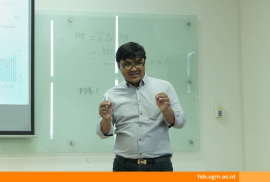Waqf has become one of the strategic solutions to achieve the Sustainable Development Goals (SDGs), especially in poverty alleviation and improving the quality of education in Indonesia. This was the main focus of the WAKAFPRENEUR “Goes to Campus” workshop with Yusri Akhyar, S.Sos, CWP, CWS, the Executive Director of the Indonesian Waqf Education Foundation, at the FEB UGM on November 22, 2024.
In the workshop session titled “Sustainable Social Impact through Cash Waqf,” Yusri emphasized that waqf can play a significant role in poverty alleviation to achieve SDG Goal 1, which focuses on ending poverty. According to him, the most effective solution for poverty alleviation is through cash waqf.
Yusri explained that poverty alleviation requires long-term strategies that are consistent and collaborative. What often happens in Indonesia, however, is the rampant distribution of social assistance and donations. This approach is considered less effective and unproductive.
He pointed out that poverty alleviation in the Yogyakarta Special Region has mostly revolved around “blessed Fridays,” government social assistance, public charity/infaq, and zakat donations. These activities cannot eradicate poverty because the assistance is temporary and has no sustainable impact as it focuses only on basic daily needs.
According to him, poverty alleviation should begin with building human resources. This can be done through education and training, ongoing financial support, and access to working capital.
“The challenge has been that while training programs exist, not everyone is aware of or has access to them. Another challenge is that some people who have received business support still lack the capital for operational costs,” he explained.
Regarding SDG Goal 4 on quality education, he also emphasized that quality education is not just about providing free education. Instead, achieving quality education requires providing the best infrastructure, such as scholarships, research facilities, teacher welfare, and teaching facilities. He mentioned that leading global universities like Harvard University rely on endowments to support students’ intellectual development and teaching quality.
“Cash waqf can be the basis for sustainable funding to support the development of education in Indonesia,” he said.
He further explained that cash waqf has excellent potential as a long-term funding solution. Cash waqf can be used to build an endowment fund that can later be channeled through zakat management institutions.
In conclusion, Yusri emphasized the importance of multi-stakeholder cooperation to achieve the 17 SDGs, including poverty alleviation and quality education. Partnership and collaboration involving various stakeholders, including the government, the public, and waqf management institutions, is expected to accelerate the achievement of SDG goals in the country.
“Through cash waqf, we can create sustainable social impact and achieve a world without poverty and quality education,” he concluded.
Reporter: Shofi Hawa Anjani
Editor: Kurnia Ekaptiningrum
Sustainable Development Goals










